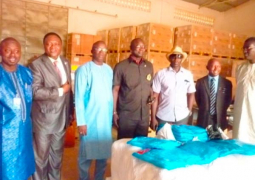A two-week international workshop on journalism's role in conflict transformation and peace building is already underway in the Ghanaian capital
Taken together with the theme of this year's World Press Freedom Day celebration (The Potential of the Media to Foster Dialogue, Mutual Understanding and Reconciliation), journalism can be described as an arbiter in every sense of the word. The theme recognizes the role the media can play in bringing about dialogue that fosters peaceful co-existence among diverse peoples. In its role as an interface, the media provide a platform for various groups to thrash out their differences in the best interest of peace and progress.
It is this point that UNESCO Director General tries to drive home in his message on 2009 World Press Freedom Day. He says: "Respecting cultural differences while preserving freedom of expression will always exist as a tension to be debated and negotiated in any democracy. UNESCO believes that frank, even harsh speech is our right unless it seeks to incite discrimination, hostility or violence. Any attempt to restrict the right to freedom of expression must be balanced against this criterion..Strengthening the principles and practices of a free and professional media is the most sustainable way of encouraging a media culture that works towards building peace. Only a media that is vibrant, independent, pluralistic, inclusive and fair, editorially free and beyond censorship and influence from owners or interests can contribute to dialogue and reconciliation across divides."
So as our colleagues are meeting in Accra to deliberate on ways and means of using journalism to promote peace in Africa, we urge them to bear in mind that in addition to the conditions that the UNESCO Director General has set out in his statement, they must harp on the value of responsible journalism. We would like to add that only an ethical journalism can foster the sort of dialogue that will bring about mutual understanding, reconciliation, peace and then progress.
A journalism that ignores ethics runs the risk of endangering society as it pits vested interests against one another, as we saw in the Rwanda Genocide. When journalism debases itself this way, it lends itself to contempt and disrepute. This is the challenge facing contemporary journalism - to insist consistently on the highest ethical standards so that will be better able to function as an impartial arbiter that will promote social cohesion and prosperity. This challenge is even more compelling now that the entire world looks to ethical journalism to help break humanity away from the shackles of intemperance, violence, conflicts and wars.
"Knowledge is power if you know it about the right person."
Ethel Mumford
Read Other Articles In Article (Archive)



